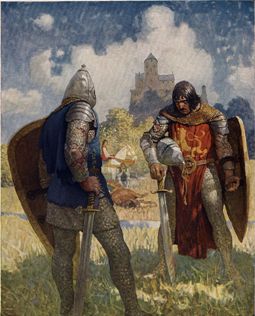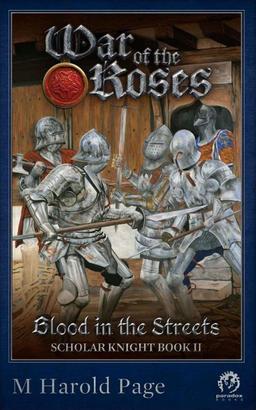Chivalry: Not Really About Opening Doors (and Still Quite a Useful Coping Strategy)

So, Lancelot is fighting this knight who insulted him. A few blows in and the rude fellow is on his knees: “Mercy, Sir Lancelot!”
Sir Lancelot stays his hand. He always grants mercy when asked.
However, before he can help the other chap to his feet, a lady rides up. “Lancelot! I beg you a favor.”
“OK…,” says Lancelot. He also always grants favors to damsels.
“Give me that knight’s head! He slew my sister.”
Lancelot frowns. Now he’s caught between two imperatives.
He can’t give the lady her favor and spare the other man.
What’s he going to do?
Well, actually, since he’s a knight, he can do just that. He helps the defeated knight to rise. “Very well, old chap,” says Lancelot. “I grant you mercy this time. Now we’ll take a short break, then I’ll fight you for your head.” Which he does.

Yes, Lancelot can satisfy both moral imperatives as long as he does so in their silos rather than tries to find some summation. This, of course, comes from Chretien De Troye’s 12th-century version of the Arthurian tales, but the whole mythos is scattered with silo morality.
Now, in case you think these are all fanciful tales to amuse the ladies, Medieval History is pretty much the same. Let’s have a couple of examples from the life of my hero William the Marshal.
King Henry the Younger (heir to the throne and deputy king, who I always imagine played by a young Rick Mayall) was at war with his dad King Henry the Elder. The royal brat got himself into such a mess with his mercenaries that his father actually let the Marshal through the lines in order to sort things out. Henry the Elder even granted William Marshal permission to make war on him!
And here’s another one. William once helped a widow get her mattress out of her townhouse before the street burned down. All very chivalric, but William was actually part of the force that was razing the town.
So, on the face of it, real chivalry is not very impressive: OMG here’s a complex moral problem. I know — I’ll solve it by not actually taking any sort of stand.
But then remember the modern Serenity Prayer?
O God, give us the serenity to accept what cannot be changed,
The courage to change what can be changed,
and the wisdom to know the one from the other
There’s something about its sentiment — wisdom? — that transcends denomination and even theology.

Now, the thing about being a knight was that there was not a lot that could be changed.
Knights lived in grim times when the swords were sharp and economic warfare meant burning people’s homes. There were safety nets, but they were woven of honor, face, kin, friendship and — ultimately — the bond between lord and follower making them ultimately constricting.
Chivalric silo thinking was the healthiest way of coping:
“If I fight my friend — we all grew up together — I’ll feel bad, but then if I don’t I’ll lose face and my wife and children will die in poverty. So I’ll greet him warmly, then try to kill him in a fair fight…”
“If I aid the king against my lord, my lord will take my lands. If I do aid my lord, then I’ll be a traitor to the king and he’ll take my lands. So I’ll send my son to help my lord and I’ll go to help the king. Whoever is on the winning side can intercede for the other… And of course we’ll both do our best to smite everybody who gets in our way.”
Beyond that, silo thinking was a way of heading off the cognitive dissonance that would otherwise result from living in such contrasting worlds. Knights were often also poets, scholars, epicureans and also — sometimes — loving husbands and parents. Chivalric silo thinking enabled them to deal with the classic modern era angsty question,”Which is the authentic me?” by simply ignoring it as meaningless.
Last example.
James IV of Scotland lived like a Renaissance monarch, built sophisticated palaces, enjoyed Early Modern comfort. But he still died at Flodden, sword in hand, armour splattered with other men’s blood, leading from the front like a tartan Conan.
How could he not? That constricting safety net left him no wiggle room.
Chivalry says, “Don’t waste energy on wiggling. Live and love and slay and be content.”

Now consider we moderns living through a hi-tech re-run of the 1930s. How much wiggle room do we really have?
At work we have too little power or too much. Many of us need to be ruthless, if not for our own sake then for that of others; businesses that tolerate dead wood end up on the pyre of creative destruction, taking with them people’s mortgages and retirement plans as burnt offerings. We often work for organisations we despise and we have no choice because of hearth and home and children and roofs over heads and college fees.
And there’s so much wrong in the world, and we can’t change it because our dependents have too much to lose, or because we have too little time, or because it’s almost impossible to work out where to stand even if we could make a stand.
We angst about it, but most of us — as we enter middle age — come to an accommodation: “I can change this, but not that. I have to do this unpleasant thing, but I don’t have to be mean when I do it.”
You can spin that pragmatic wisdom with the Serenity Prayer, or Buddhism, or some brand of religious fatalism. However, ultimately, will your stance be any different to that of a knight: “Hey sirs, hold my torch while I help this widow with her mattress…”?
M Harold Page (www.mharoldpage.com) a life-long student of all things knightly, is poised to launch is old-school Heroic Fantasy trilogy, Swords Versus Tanks. While you’re waiting for that, you can buy his action-packed Dark Age adventure, Shieldwall: Barbarians! (UK, Epub) and also learn how to plan and write your novels using his Storyteller Tools (UK, Epub).
Nice post. I really like this argument. But I have a question. If the village is going to be burned anyway, isn’t it better to help the lady with her mattress?
You mean, “You lads burn everything, I’ll help the old woman”?
Not viable if you need to be a team player. Plus then you’re putting all the moral responsibility on your mates, who won’t like it.
Very interesting take on medieval psychology, Mr. Page. “Silo thinking” reminds me of some of the ways Jean Piaget described the mental and moral development of children, which ties in with how Barbara Tuchman viewed the medieval period as having a sort of “arrested development”, adults without full childhoods who, in a sense, remained childlike (or childish).
Great book, Distant Mirror. Not sure I agree with Tuchman, though.
Isn’t she comparing her middle class world of academics and intellectuals, all reflective and trained to think about morality, with a world of soldiers and merchants?
Things like “What happens in Vegas stays in Vegas” suggest to me that most ordinary people don’t actually think much differently from Medieval folk.
And, as per my article, I think silo thinking is a pretty normal and healthy response to what we can’t change.